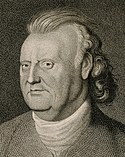Edward Waring
Edward Waring (ur. ok. 1736 w Old Heath w pobliżu Shrewsbury w hrabstwie Shropshire, zm. 15 sierpnia 1798 w Pontesbury w Shropshire[1]) – angielski matematyk.
Od 1760 aż do śmierci wykładowca matematyki (Lucasian professor) na Uniwersytecie w Cambridge. W pracy Meditationes Algebraicae sformułował hipotezę, znaną jako problem Waringa.
Nagrodzony w 1784 Medalem Copleya[2].
Zobacz też
Przypisy
- ↑ Waring Edward, [w:] Encyklopedia PWN [online] [dostęp 2021-12-16].
- ↑
 Award winners: Copley Medal (ang.), Royal Society [dostęp 2021-09-24].
Award winners: Copley Medal (ang.), Royal Society [dostęp 2021-09-24].
Linki zewnętrzne
 John J. O'Connor; Edmund F. Robertson: Edward Waring w MacTutor History of Mathematics archive (ang.)
John J. O'Connor; Edmund F. Robertson: Edward Waring w MacTutor History of Mathematics archive (ang.)
Media użyte na tej stronie
Autor: unknown, Licencja: CC BY 4.0
Joseph Lister, Copley Medal (gold), 1902
Wellcome Images
Keywords: Joseph Lister
Source: http://www-history.mcs.st-andrews.ac.uk/PictDisplay/Waring.html Artist died >70yrs ago therefore PD.
Miscellanea analytica, de aequationibus algebraicis, et curvarum proprietatibus. Ab Eduardo Waring .... - Cantabrigae : typis academicis excudebat J. Bentham, 1762. - [4], IV, [8], 162 p., [4] c. di tav. ripiegate ; 4º .





